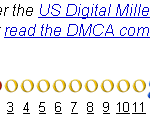Twice this week I wrote “2008” as the date. It’s funny because I was pretty clear that it was 2009 back in January and February, but I seemed to have forgotten that fact now we’re in March. March Madness, as they say. I did the NPD analysis for February 2009 yesterday, pretty much the same old story with a bit more positive spin for the PS3, but not enough to make it outsell the same period in 2008 (looks like I’m not the only one pining for 2008). There’s more bad news coming the PS3’s way, as you’ll find out later on.

But before we get to that, let’s go through the copyright news first. The story of the week (well earlier on anyway) was Apple’s new iPod Shuffle that seems to have a DRM chip on it.
This caused a bit of a stir as expected, but Apple later came out and denied that the chip would be used for anti-piracy measures. Instead, the chip is used to authenticate third party accessory licensing, making sure third party products go through Apple’s licensing scheme. Not really sure if this is any better than anti-piracy DRM, to be honest.
When I made a list of all the major copyright trials going on at the moment, I forgot about Mininova’s trial which will start in two month’s time. So that’s IsoHunt (Canada), iiNet (Australia), The Pirate Bay (Sweden) and Mininova (Netherlands). Looks like a very international operation is happening to rid the world of nasty pirates, except in Australia’s case, it’s actually an ISP (and one that responds to infringement notices like most other ISPs around the world). But iiNet apart, it looks like all the major torrent sites are being hit in a co-ordinated effort by various agencies, but of course illegal torrents are now even more popular than before, and still being offered on the above sites. And if they fall, others will take their place.
So while going after the distributors of torrents, the powers that be will also go after individuals (through threatening ISPs), with the so called “three strikes” rule being their current modus operandi. Basically this means that if they detect infringement activity, they will pass it on to the ISP which will then warn the user for three times before automatic disconnection occurs. The ISPs are supposed to absorb the cost of doing this, which only means they’ll pass it on to users. Google has also spoken out against this method, calling it disproportionate. In many cases (far too many cases), the infringement may not even have occured, or was done by someone who did not own the Internet connection (Wi-Fi stealing neighbour, for example). And without an appeals system, many legitimate users and businesses will be disconnected and there’s nothing they can do about it, other than to sue for damages. And of course, they’ll be up against teams of lawyers with unlimited funds if they do go to court. Imagine a court where the prosecutor is also the judge, and you do not get to defend yourself and you have to pay for everything, and this is pretty much what the industry want . Google has a lot of experience with how such a system would not work, as it handles DMCA complains regarding its own listings. The DMCA allows for content owners to send “takedown” notices to sites like Google, asking them to take down infringing content, which in Google’s case is usually just links to piracy websites. Google has to process each request, and they have come out with the unbelievable statement that most DMCA takedown notices are in fact illegitimate. 57% of these notices were done to get rid of competitors, while 37% were not valid copyright notices at all.
Back to Australia, where the government is on a crusade to censor the Internet worse than the worst of Internet censoring countries. They even produced a blacklist of all the sites that would be banned, which included quite a few legitimate ones as they always do, and also blacklisted sites that have published the blacklist. And linking to any of these sites, including the legitimate dentist’s website, or the tour operator, or the sites that have published the blacklist, could cost the website operator a $11,000 per day per link penalty. This is because in Australia, linking is considered as bad as hosting the content, whereas other countries do make the distinction. Technically, this could apply to Google, which in their huge database probably links to all the sites on the blacklist, and so in the face of the severe penalty, may have to withdraw from the Australian market if indeed the government gets its wish of a national filter scheme. If this scheme became a reality, you can just imagine the 57% of complains to get competitors added to the blacklist, can’t you?

Onto happier HD news. Is DVD better than Blu-ray? IGN seem to think so, and they’ve published an entire article going through the various reasons.
I don’t think it’s a case that DVD is better than Blu-ray, but more that DVD is a *better option* than Blu-ray *at the moment*. Much in the same way that a Core 2 Duo is “better” than an Core i7. Nobody is saying that Blu-ray isn’t superior to DVDs, it’s just that perhaps it has some ways to go before it really is the must have, economical, option to home videos. For one, the current range of Blu-ray hardware has a lot of room for improvement, and prices can still come down even more.
But the hardware situation may change soon with Oppo now getting into the Blu-ray game. The Oppo BDP-83 may be the first universal Blu-ray players with excellent DVD upscaling, and comes at a price that won’t require starvation at some point in the near future. It supports BD-Live, decodes all the HD audio formats, plays back all the audio DVD formats, and will almost certainly feature the DVD upscaling engine that made Oppo famous. All they need to do is to make it region-free, and it will become a must-have.
Apple will start to offer HD movies on iTunes, which is yet another step towards movie downloads taking over from the humble optical disc. It won’t happen overnight, but it’s gonna happen.
![]() And in gaming, developers, like gamers, bloggers, forumers, and basically anyone knows what a PS3 is, wants Sony to cut PS3 prices.
And in gaming, developers, like gamers, bloggers, forumers, and basically anyone knows what a PS3 is, wants Sony to cut PS3 prices.
But instead of agreeing, Sony has responded by mocking developers for asking the world. when all they have asked is for the best solution to save the PS3. Not satisfied with the mocking, they proceeded to make it even more costly for developers to publish games on the PS3 by introducing bandwidth fees for downloadable content. This could mean an extra quarter or half million for your typical 1 GB demo. Xbox Live has no such fee for developers. Sony claims this is needed because they don’t charge users for PSN, which is fair enough, except demos on the 360 are free to download for non paying users (Xbox Live Silver accounts), after the usual first few days of exclusivity on Xbox Live Gold. Expect more and more developers refusing to release demos on the PS3, which will then mean less games sales for all concerned and make the PS3 even less popular. Is this what Sony wants? I think it is, because everything they do seems to be to try and kill the PlayStation brand. Of course, the other explanation is that they’re still acting as if they’re the kings of video gaming, when in fact, they’re now in a distant third place.
The other bit of news was Sony wanting to bring Wii like controls, but not to the PS3. Instead, they want to do it for the PS2. It makes sense, since the Wii’s graphics isn’t that much better than the PS2’s, but as you’ll see from my NPD analysis, the PS2 is on its last legs and it doesn’t really make sense to try to prolong its life, when you’ve got a new console to try and save.
Okay, that’s it for this week. Sorry about the lateness of this post, as it’s been a busy (and very unproductive) day for me. See you next week.




